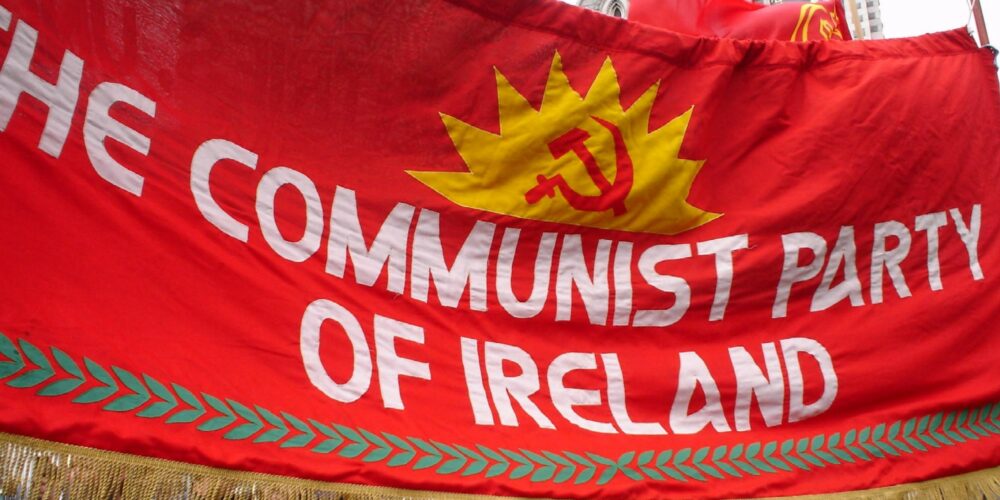The Communist Party of Ireland has time and time again shown its analysis of capitalism and imperialism to be correct. Where we have been able to intervene and make a contribution to the wider political movements, debates and campaigns we have actively intervened in what were popular reformist demands, shifting them to transformative ideas and demands, in a number of crucial areas: (1) repudiating the debt, (2) austerity is working, (3) the triple lock of imperialism, (4) public ownership of water enshrined in the Constitution, (5) universal public housing, and (6) repeal of the Industrial Relations Act, to name a few.
Each one of these demands has led to the establishment of, or a contribution to the narrative of, campaigns, with varying degrees of success, some of which are continuing. Importantly, however, they challenged both the establishment rhetoric and narrative and the reformist demands of the “left” wing—socialist, republican and social-democratic forces—by consciously bringing a sharp class analysis and the transformative demand to the particular issue.
It was only after this conscious effort by the party that we have shifted the balance of thought from reformation to transformation, from a basic economic analysis to a class analysis; and now we must bring that central feature of party work to the battle of ideas that is constantly evolving on many issues.
We know that the left parties in Ireland—Sinn Féin, the Trotskyists, the Social Democrats, and others—will take up populist and, in the main, progressive positions, but because they are fundamentally wedded to the electoral process and have distanced themselves from opposing EU, American and British imperialism they seem to lack a vision for the working class outside of capitalism and its imperialist structures. “Tax the rich” is about as far as these parties will go when presenting themselves as an alternative in confronting capitalism and the establishment political parties, Fianna Fáil and Fine Gael.
But taxing the rich, which is a progressive idea, is not in fact confronting capitalism but merely trying to reshape the structures within capitalism: a changing of the guard in favour of labour.
Many parties proclaim themselves socialist and want to bring about socialism in Ireland, the CPI included. If we are conscious of our goal we must work backwards to assess our best path towards that goal of successful revolution for building socialism. In reality, at this point if we were to present a “socialist programme,” what is the real likelihood of different groups, communities, work-places and unions not only endorsing it but actively pursuing it?
In other words, has the working class reached a level of class-consciousness where it is ready to take up the cause of socialism—industrially, socially, politically, and, if necessary, militarily? Would the different arms of industry, services and agriculture work together, in unison and in solidarity with other sections of society, to bring about a change in the mode of production, willing to defend it at all costs?
This is where we not only want them to be but need them to be. However, this is not where the collective class-conscious is at the present time. So the question is one that has haunted socialist movements for generations: How do we go from A (where we are now) to B (socialism)?
We start from an analysis of where we are now; and at the moment the working class is in a defensive state, because our livelihood, wages, jobs, services, communities, health and the environment are under persistent and sustained attack, which has only increased since the onset of the covid-19 pandemic. We see examples such as the valiant efforts of the Debenham workers, who have been on strike for more than 200 days against an unscrupulous capitalist enterprise. These attacks on workers, their jobs, their livelihoods will only increase further in the months and years ahead.
I have become more and more convinced that if we only present and mount defensive actions, or concentrate on individual insular reforms related to the particular business or industry, we may be in danger of losing a lot more ground to the forces of reaction and intolerance—the very people who were rightly beaten off the streets a few weeks ago.
Without a conscious effort of class-conscious forces to expose and rupture the contradictions and fault lines that exist within the system we will forever be back and forth seeking reforms, from all shades of political parties in government. We cannot underestimate the ability and resourcefulness of the bourgeoisie in maintaining their class rule. The capitalist system is fully capable of meeting the individual reforms when enough pressure is applied. The workers’ movement in capitalist countries, which has fought tooth and nail for every reform to better their conditions, is testament to that.
Capitalist governments are fully capable of imposing taxes on the rich, are fully capable of nationalising industries and services, are fully capable of securing welfare and social safety nets, are fully capable of improving their infrastructure, and fully capable of moving towards “green energy” and “zero carbon” economies. What they are not capable of is doing all these at once, for a sustained period and in a wide range of countries, which is the most essential element in our struggle for a just society, an end to the exploitation of the people—wherever they live and labour—and for a rebalancing of the earth system, which is tilting towards a point of no return.
The capitalist system and the capitalists who benefit from the mode of production, when put under the strain of these reforms under the weight of their own contradictions, enter into a state of crisis. In modern history (after the Second World War) this is exactly what happened to Western economies after a prolonged period of state and public investment in what was known as the “Golden Age” of capitalism, what I would deem the golden age of social democracy. A boon for the public became a crisis for the private capitalist class; and, beginning in the late 1960s, a profitability crisis emerged, which is shown in the graph. To counter this free fall in rates of profit the capitalist class and the imperialist powers went about implementing the greatest shift of industrial productive forces in history, ushering in what is generally called the neoliberal age: the age of manufacturing in the global south, of de-industrialisation in the global north, of the dismantling of welfare states, and the privatising of state-owned industries, services, and land.
The reason for emphasising this is that it is clear that capitalism, by virtue of historical fact, is incapable of either solving or resolving the issues of the people and the environmental emergency as well as resolving its own internal contradictions and crisis. The choice for capitalism and capitalists will always be to save themselves, save their wealth, even going so far as jeopardising the planetary system in pursuit of their private accumulation of capital and wealth.
The question for us, which is of extreme importance, is, How do we present an alternative to capitalism that is in tandem with the people’s state of defence yet is capable of stretching the horizon of workers’ demands, and advancing towards a programme for socialist revolution and a socialist mode of production?
I would argue that the best way forward—that open space between A and B—is to popularise a transformative democratic programme that lays open an expansion of the democratic demands of the working class towards socialist revolution and socialist construction. The time has passed for thinking about separate campaigns that deal with one particular issue: we must begin to link the individual struggles (e.g. the Debenham strike) with the broader class struggle (company profits over workers’ livelihoods) and explicitly expose this in any and all campaign literature. We must veer our course towards political class struggle, encapsulating the systemic nature of our problems and our interconnectedness and interdependence, from health to housing, from industry to agriculture, from energy to transport, and everything in between.
The weakness of just seeking reforms within the system is that it excludes a distinctive class and anti-imperialist line of analysis and understanding, because the target of the demand is not striking at the class nature of the state, and those who dominate class power, but concentrates on how the resources of the capitalist state are distributed, or are being stripped and privatised.
So, rather than developing a class-consciousness that will move us from point A to point B, it will in fact stunt that development and keep us in a perpetual state of A.
We have already mentioned just how adaptable the ruling class are at appeasing various elements of the people’s demands; so, in the absence of a conscious effort of an organised working class, reforms will be cherry-picked by governments in power to damp down the most threatening forces. It is the old and simple but effective strategy of divide and conquer.
At the last national congress of the CPI the party emphasised the triple lock of imperialism in this country: British imperialism (occupation and partition), European imperialism (treaties and EU Central Bank), and US imperialism (foreign direct investment and the military use of Shannon Airport). The democratic demands of the people—ensuring food, housing and health security, nationalising and enshrining in our constitution public resources, services, amenities, and industries, securing welfare and social safety nets, improving and updating infrastructure and transport systems, moving towards green energy and zero-carbon economies, imposing a progressive tax system, ensuring union rights, recognition and progressive legislation, among others—will be hampered on different levels and for different reasons by this triple lock, a triple block in preventing our people having the democratic and sovereign right to enact and secure such demands.
Within each of these democratic demands lies a transformative element that can turn a simple reform into an opportunity to deepen and develop class-consciousness and democratic principles and practices. It is up to the most conscious members of the class to lay out the transformative demands. These stretch the envelope of working-class demands, because they are shaped by the most class-conscious section of the working class, bringing into clearer focus the conflict that exists within class relations. They are born and are developed from the reformist demands of the people but are then shaped by applying Marxist-Leninist theory to form transformative and revolutionary demands. Given the context of the demand, campaigns built on these can become part of the overall anti-capitalist and anti-imperialist struggle of the people.
The key is in how we construct our demands, which are in keeping with and are complementary to the demands of the wider working class and its forces but also instinctively create a separation from the insular reformist demand, to develop into a broader transformative demand and campaign. Only by the active organisational engagement, education and action of the CPI and other class-conscious forces with the wider working class can we hope to achieve and build a movement broad, disciplined and strong enough to be willing to demand, support and defend a socialist programme and ultimately a socialist revolution.
Moreover, as single issues, capitalist governments would actually find it difficult to implement transformative demands without undermining the structures and rules imposed by the imperialist powers and the native capitalist ruling class. That, however, is the point in making these demands, as it exposes the fundamentally undemocratic nature of how our country is run and exposes the interests that these policies and rules actually favour.
More importantly, the people demanding them will have deepened their class-consciousness, which goes beyond the mere reform of the system. Individually and as a totality they are transformative, because capitalism is incapable of conceding these demands without jeopardising their own structure and ultimately jeopardising the sustainability of capitalist profit, leading to a crisis within the system. So, what is good for the people becomes a crisis for the system, and what is good for the system becomes a crisis for the people.
It is the antagonistic nature of the capitalist class system that prohibits the reconciliation of this internal contradiction. But before we grandstand the cause for socialism, our ultimate goal, we must forge among the people popular support for a tangible programme of democratic demands—a transformative democratic programme. Within this programme I believe lies that transitional space between A and B.






